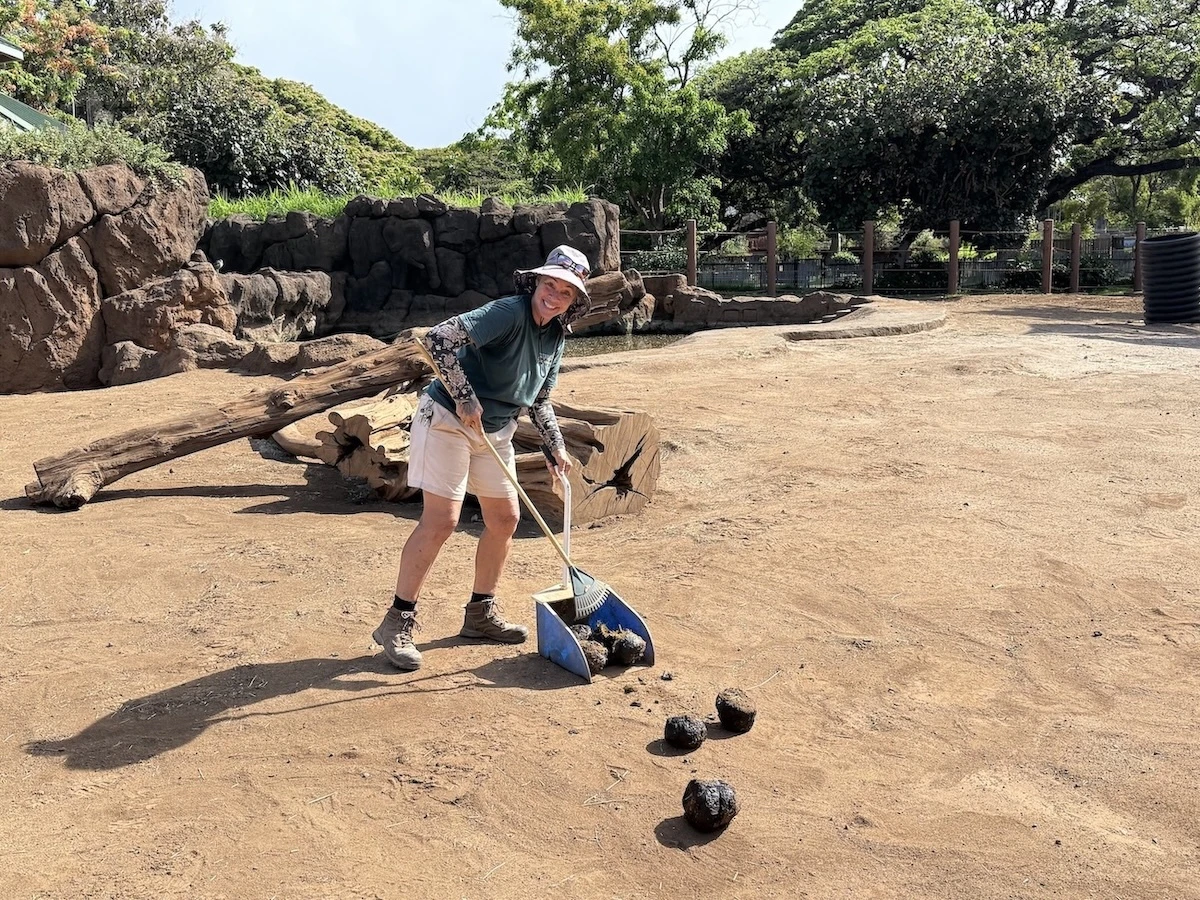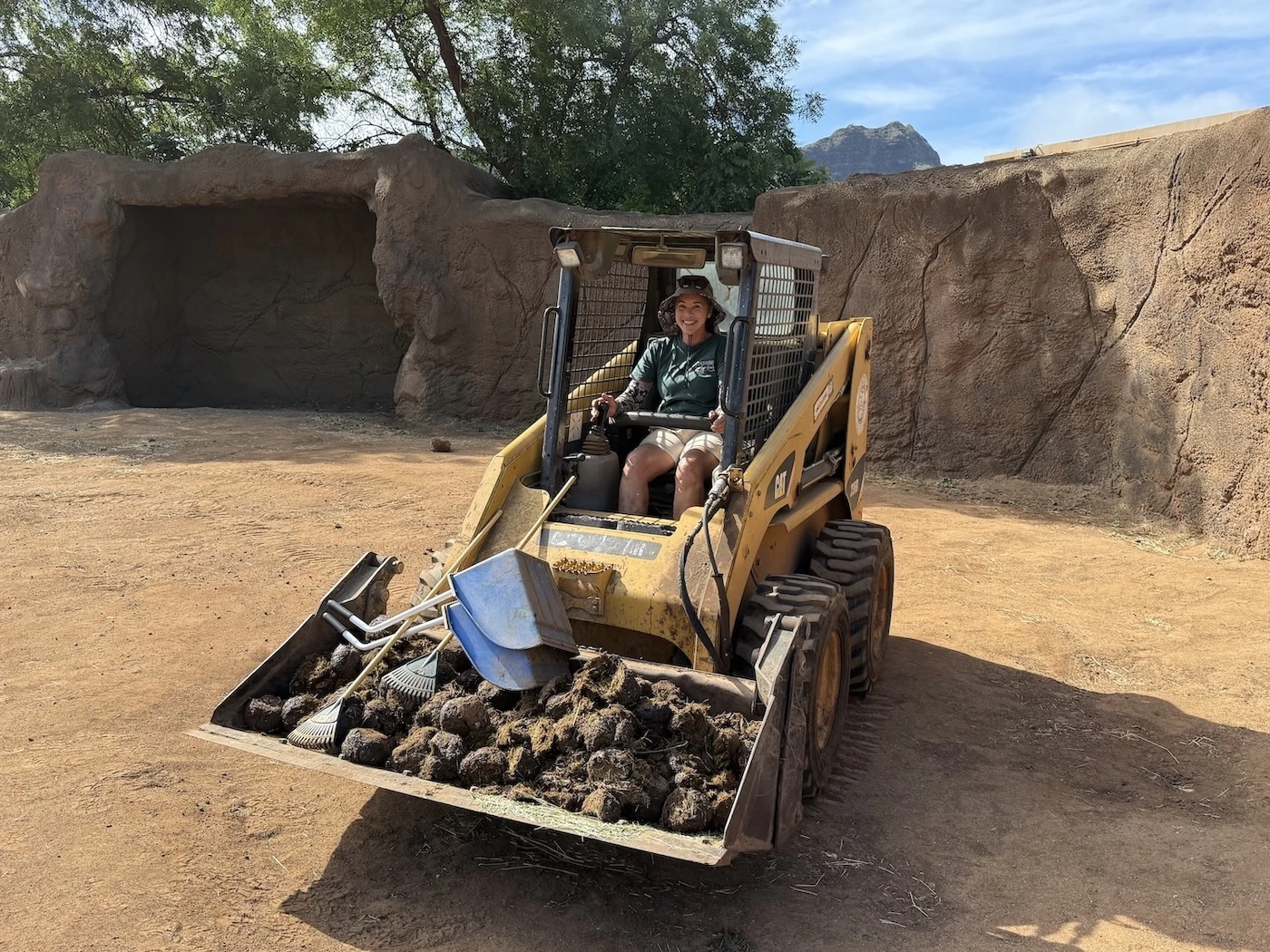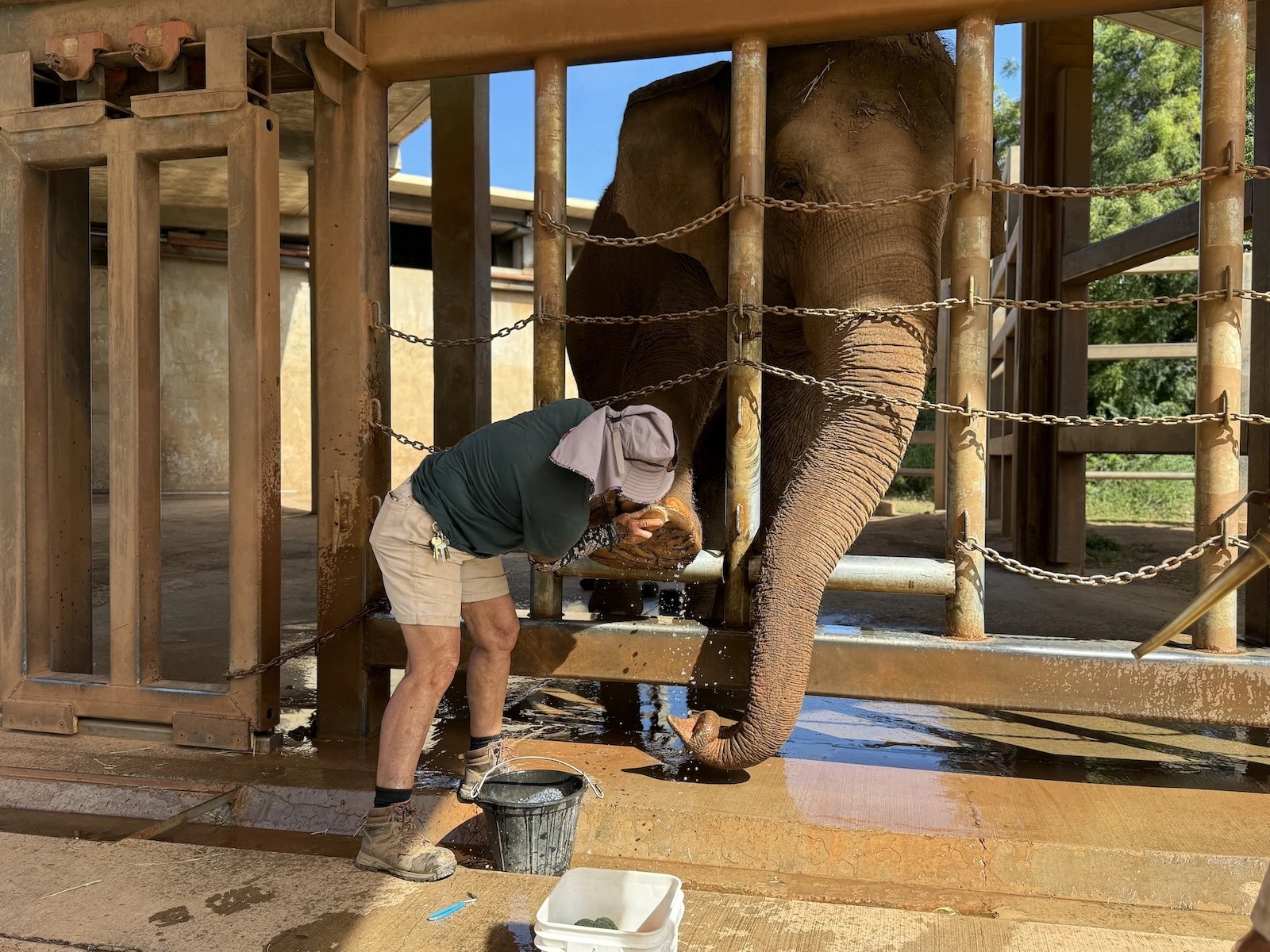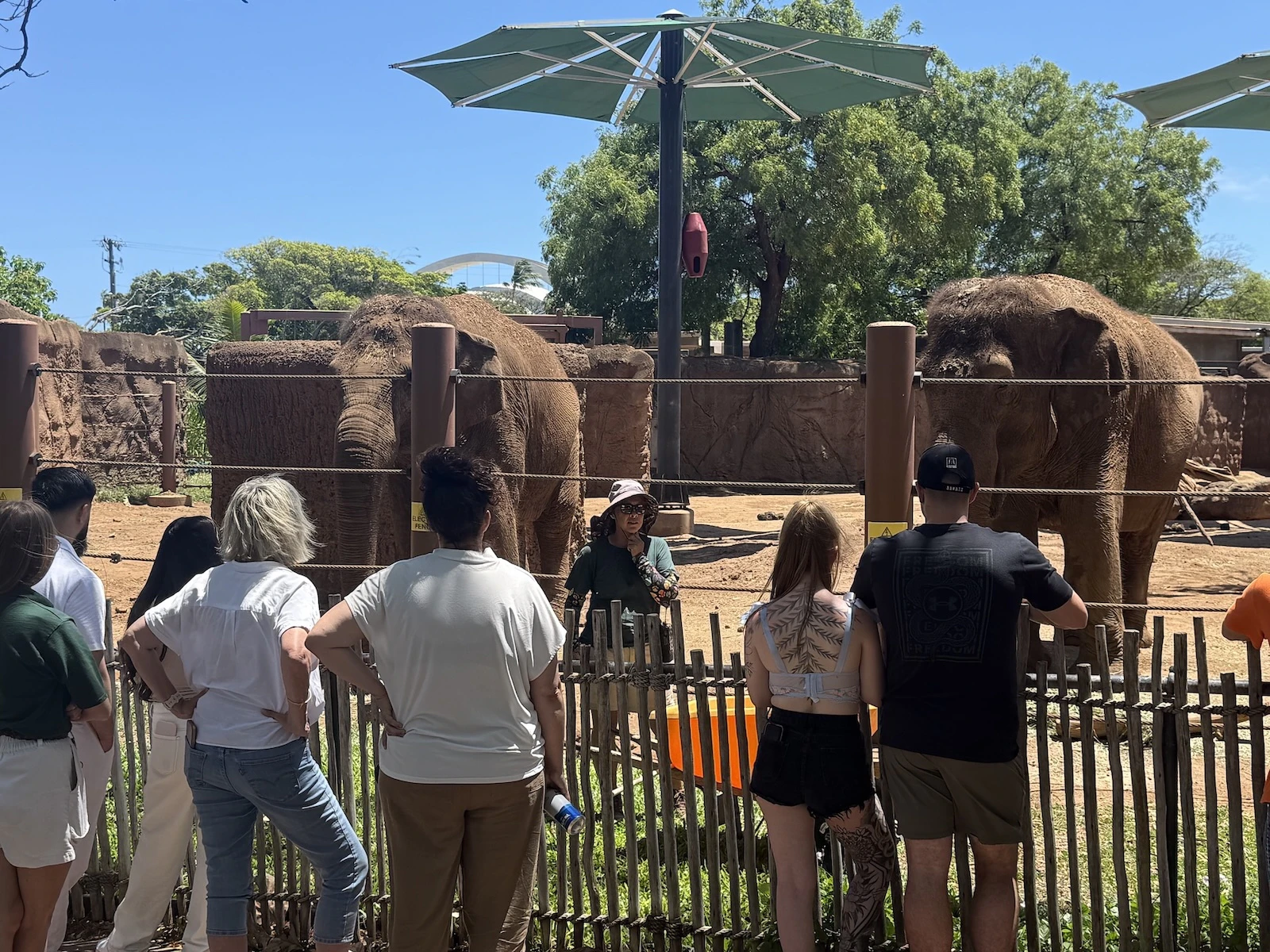Caring for two “girls” that each weigh about 10,000 pounds and stand over nine feet tall would no doubt be daunting to most people. Not to Malia Davis, who has been looking after Mari and Vaigai since she joined the Honolulu Zoo’s staff 33 years ago.
They are Asian elephants — an endangered species — who came from zoos in India. Mari was 16 years old when Davis was hired in 1992. Vaigai was six when she arrived two weeks later.
“Vaigai is 39 now, and Mari will turn 50 in September,” Davis said. “The average lifespan for elephants is 40 to 60 years old, so they’re both older girls. Mari is a Cadillac; she’s methodical and easygoing and likes to wear tires on her feet like shoes. Vaigai is a hot rod. She’s always moving, always doing something, from rolling a small log around to using a stump as a stool so she can snack on the tops of trees. If you watch them, you can figure out who’s who really fast.”
Davis was raised in Kailua by her maternal grandparents, surrounded by animals she adored. Her grandfather inspired her love for animals, and her grandmother nurtured it by buying her an encyclopedia of animals that held her attention for hours at a time.
Today, Davis lives off the grid in Central O‘ahu with three dogs, three chickens and five cats. “I’ve always had pets — even a goat, a miniature horse and two pot-bellied pigs at one time,” she said. “Animals are loyal and loving and have brought me so much joy. I can’t imagine life without them.”
After graduating from Kailua High School in 1980, Davis began working as a ripsawyer at a lumber mill in Humboldt County, northern California. But Hawai‘i remained close to her heart, and she returned six years later as a single mom with a four-year-old son in tow.
A chance encounter with a friend opened the door to a position at Marine Corps Air Station Kāne‘ohe Bay, assisting researchers who were training dolphins and false killer whales for the Naval Ocean Systems Center (now the Naval Information Warfare Center Pacific) headquartered in San Diego. One of the center’s primary responsibilities was developing ways for the Navy to find and recover objects in the deep sea.
“Getting that job was pure luck,” Davis said. “I was 24 years old with no college degree and no knowledge about marine mammals.”
But she learned a lot, including participating in a study where dolphins were trained to follow a boat into the open ocean where a big metal piece from a plane or helicopter was dropped. They would have to dive deep to locate it, and when they did, they would swim up and hit a target (pool floats attached to a PVC pipe) mounted on the side of the boat.
“We’d give the dolphins a buoy, and they’d take it down to the part of a fuselage or whatever,” Davis said. “They’d release the buoy, which would float to the surface as our marker. We then retrieved the object to confirm the dolphins had successfully completed the task.”
That marine mammal program had operated at the Kāne‘ohe marine base for many years before Davis started in 1987. Unfortunately, five years later, federal funding for it ended. She could’ve relocated to California and continued with it, but she wanted to raise her son in Hawai‘i and remain close to her aging grandparents. She’s certain the experience she gained in operant conditioning helped her land a zookeeper position at the Honolulu Zoo, working primarily with Mari and Vaigai.
She now supervises a staff of five as the elephant manager. Their day starts at 7:30 a.m. and ends at 4:30 p.m. During that time, they clean and fill the elephants’ water bowls and prepare their food, which includes grain; grasses; timothy hay; bamboo, banana, coconut and monkeypod trees; and produce such as lettuce, cabbage, apples, eggplant and cucumbers.
“What goes in comes out quickly, so we’re constantly picking up poop — up to 500 pounds of it,” Davis said. “All of it is used for compost.”


Mari and Vaigai are bathed daily, which enables the keepers to examine their skin, eyes, mouth and feet. The girls’ toenails are filed and their foot pads are trimmed once a month, a chore that takes up to four days for each of them.

Time is also reserved to supervise enrichment activities; for example, the elephants enjoy playing the harmonica by blowing air through their trunk and painting pictures with a brush held with their trunk. Davis and her staff also participate in daily training sessions (topics include injections, X-rays, blood draws and tethering) and help cut, tend and plant grasses and trees grown on site to feed the zoo’s residents.

Every day at 1:30 p.m., a keeper gives an Elephant Talk beside Mari and Vaigai’s habitat. The importance of conservation is a message that’s always shared. Although the commercial trade of ivory was largely banned internationally in 1989, poachers kill some 20,000 elephants every year for their ivory tusks, according to the World Wildlife Fund.
“Among other things, ivory is used for art, jewelry, medicine, furniture and religious artifacts,” Davis said. “Please don’t use, wear or display ivory if you want elephants to live a nice, long life in the wild.”
When she does the presentation, she also notes that animals around the world are losing their natural habitats, and humans are the culprits. For example, palm forests in West Africa, Latin America and Southeast Asia are being logged at an alarming rate because thousands of food, cosmetic, household and personal care products are manufactured with palm oil.
“Look at the list of ingredients, and avoid the products that contain palm oil,” Davis said. “We must be animals’ advocates; we must be their voices.”
Visiting the zoo
The Honolulu Zoo is open daily except Christmas Day from 10 a.m. to 4 p.m. Explore on your own or take a guided tour (see honoluluzoo.org/tours for details).
Four concerts remain for the Wildest Show, the zoo’s popular annual fundraiser. Mark these Wednesdays on your calendar: Maunalua, July 9; Henry Kapono and 3 Little Birds, July 16; Kala‘e and Kalena, July 23 and Opihi Pickers, July 30.
You’re welcome to bring your own picnic; food and beverages will also be available for purchase.
Buy tickets online or at the gate: $10 for Honolulu Zoo Society members, $15 for non-members, $5 for kids ages 3-12 and free for kids 2 years old and younger.
For the latest news of Hawai‘i, sign up here for our free Daily Edition newsletter.





